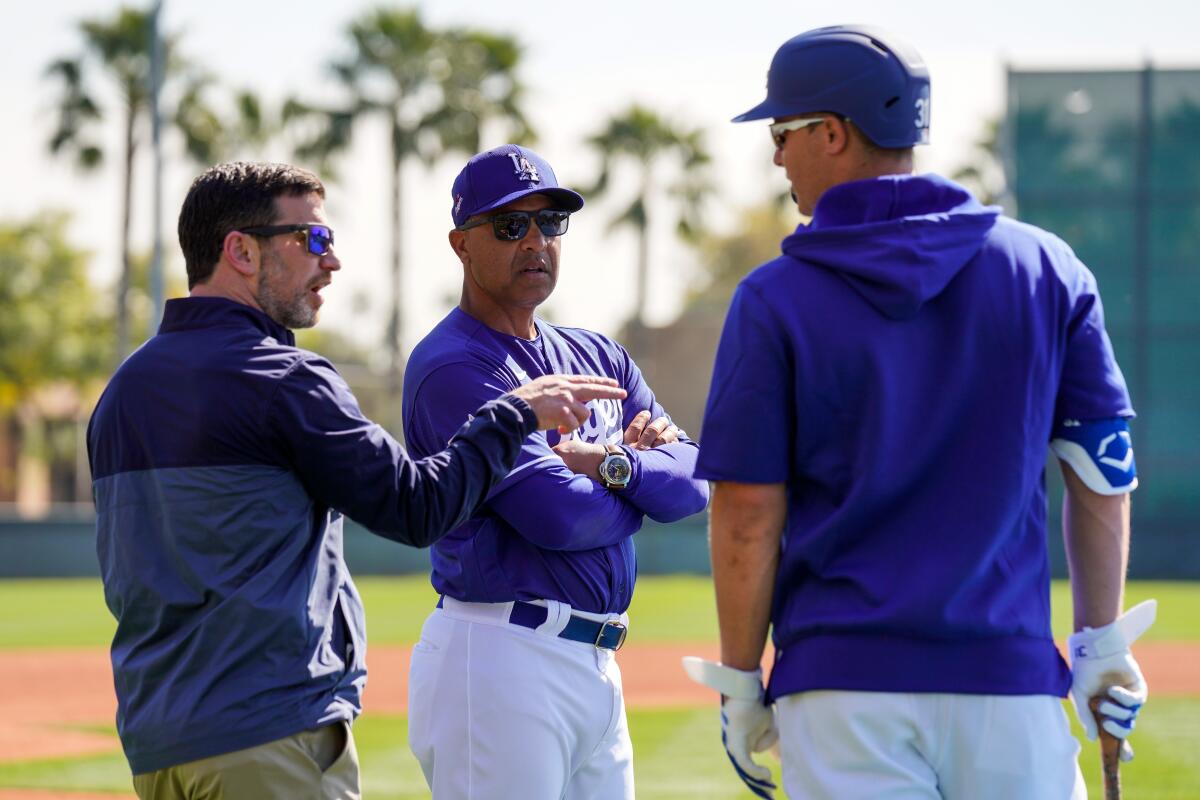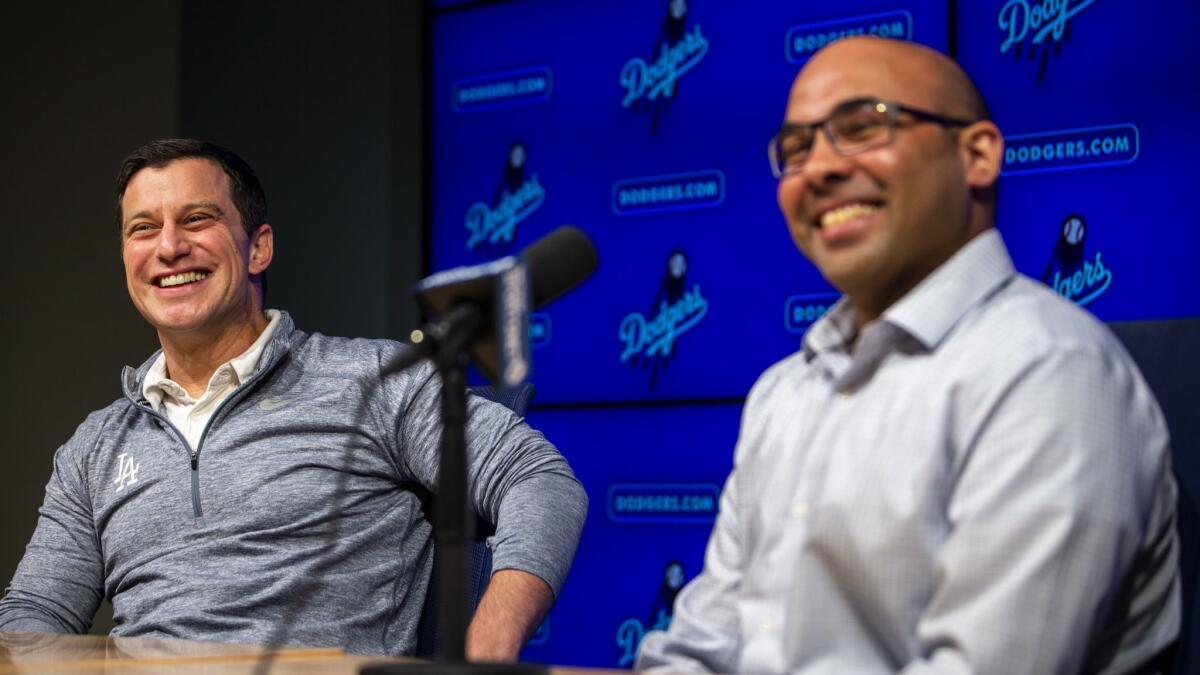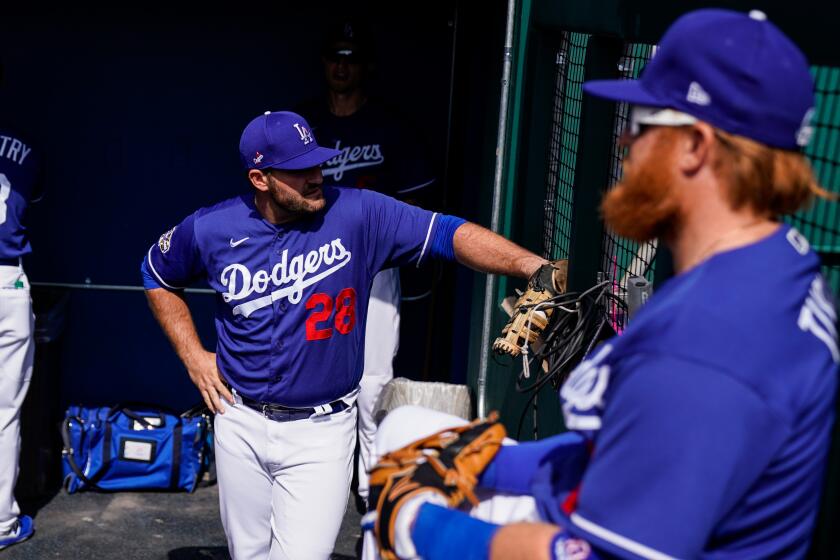Dodgers’ Andrew Friedman has a methodical approach appreciated by dugout leaders

- Share via
PHOENIX — Joe Maddon chuckled as he described his former boss.
“What people don’t realize,” the first-year Angels manager said of Andrew Friedman, “is he’s a lot older than I am.”
Not by actual age, of course. Maddon is 66. Friedman is 43. They’re from different generations, Maddon having begun his minor league playing career the same year (1976) Friedman, now entering his sixth season at the helm of the Dodgers’ front office, was born.
When Friedman was a rookie general manager with the Tampa Bay Rays ahead of the 2006 season, he gave Maddon his first managerial job. At the time, he was almost half his new manager’s age.
But as Maddon explained, Friedman didn’t act like it. Quite the opposite, actually.
“He was the adult in the room, a lot more subtle than I was,” Maddon said. “It was interesting. Even though there’s a 20-year [age] difference, he was always the older brother and I was the younger brother.”
Years later, the baseball siblings are back in the same region and, to some degree, back in the same roles. Because for all the optimism the Angels’ offseason created, from Maddon’s arrival to Anthony Rendon’s signing, it was Friedman and the Dodgers who stole the show ahead of spring training by adding Mookie Betts and David Price in a complicated trade with the Boston Red Sox that nearly fell through but ended up the envy of many throughout MLB.
“You have to give him a lot of credit,” said Farhan Zaidi, the Dodgers’ former general manager under Friedman who is now entering his second season as the San Francisco Giants’ president of baseball operations. “I don’t think people appreciate the work he did to put that deal together, the multiple parties, and then to have to redo it when the complications hit.”
Zaidi joined the Dodgers’ front office at the start of Friedman’s tenure in 2014, and learned much from his former boss. Friedman inherited a Dodgers team in 2014 that had won an NL West division title the previous season but was also saddled with aging players. He got the roster under control by exercising financial discipline over the next five seasons while doing enough that each campaign ended with a division title.
Big splashes have been rare — excluding international signings, A.J. Pollock is the only free agent signed under Friedman to receive a contract as long as five seasons. Friedman has been willing to re-sign key veterans such as Justin Turner and Kenley Jansen, but let other high-priced players leave to be replaced at a fraction of the cost by the club’s fertile farm system.
At times, Friedman’s seemingly conservative approach drew criticism, especially as the Dodgers’ financial might failed to attract Rendon or Gerrit Cole this offseason, the two biggest free agents on the market. But this month’s trade for Betts and Price, in which the Dodgers gave up Alex Verdugo and two minor leaguers, changed that narrative.

“It’s a testament to his entire time in L.A.,” Zaidi said. “Creating flexibility financially, roster-wise, where a deal like this was feasible. Over the course of his time in L.A., there were a few different scenarios like this, the big-game hunting scenarios. Sometimes those materialize, sometimes they don’t. That’s the reality of the business. I don’t know if this was a shift in strategy rather than, this is the time all the pieces fit together.”
Maddon benefited from Friedman’s similar approach in Tampa Bay, where the Rays became one of baseball’s best at using analytics to draft and develop homegrown prospects and uncover gems on the free-agent market and waiver wire.
“The thing about Andrew which he isn’t given enough credit for, which I always thought from the beginning, I thought he was a very good scout,” said Maddon, who won 754 games and the 2008 American League pennant during nine seasons with Friedman in Tampa Bay.
More than that, Maddon continued, Friedman has the right temperament for his job.
“Conversations were always easy, a lot of fun,” Maddon said. “We were very frank with one another too, which was great. See, that’s what he understands: the tough conversations, [how to] elicit a truthful response with whoever he’s working with. You don’t take it personally. It’s just an honest response.”
The Houston Astros’ sign-stealing scheme depended on real-time video transmitted to the clubhouse. MLB might ban the practice, a measure not all Dodgers support.
Friedman’s current manager, Dave Roberts, echoed similar sentiments.
“We have a great relationship,” Roberts said. “We have a mutual respect.... I think he trusts what I do on the field with players. It’s mutual with him.”
Few were more impressed — and certainly no one was more relieved — than Roberts at Friedman’s handling of the Betts-Price trade. It has put the Dodgers back in pole position for another run at the World Series. Those who have seen Friedman work up close are hardly surprised.
“He’s doing the same thing [as in Tampa Bay],” Maddon said, chuckling again, “with more money.”
More to Read
Are you a true-blue fan?
Get our Dodgers Dugout newsletter for insights, news and much more.
You may occasionally receive promotional content from the Los Angeles Times.










